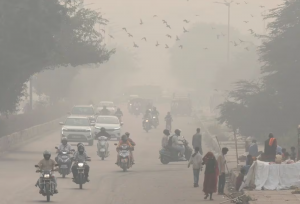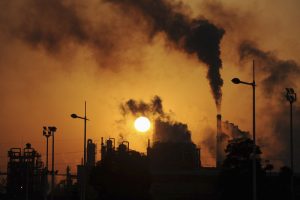Several northern Chinese cities have issued pollution alerts amid worries the country’s industrial recovery is increasing smog levels
Thirteen cities, including Tianjin and Tangshan, China’s biggest steelmaking centre, had issued “orange” heavy pollution alerts by Sunday, the second-highest alert, the National Joint Research Center for Tackling Key Problems in Air Pollution Control (NJRC) said.
Air quality in the traditionally smog-prone region of Beijing, Tianjin and Hebei has improved markedly in recent years as a result of a “war on pollution” since 2014, which involved closing and relocating industrial plants as well as raising emission standards.
Also on AF: Asia Stocks Lifted by Fed Easing Hopes But China Growth Weighs
NJRC said the recent spike had been driven by an increase in industrial activity, with steel and cement plants operating at higher levels, and diesel truck traffic also rising. It expected the smog to persist until March 10.
China has been trying to re-energise its economy since lifting strict Covid-19 curbs at the end of last year, raising fears that pollution could be allowed to rise.
An orange alert means the three-day average air quality index (AQI) has risen above 200, classified as “heavy pollution”, and normally triggers industrial closures or output cuts under Chinese regulations.
Though Beijing, where parliament is holding its annual meeting, has not issued an alert, its AQI hit 230 on Sunday night and climbed above 200 again on Monday.
Tangshan said on Saturday that it was beginning a ‘Level 2’ emergency response, the second time in a fortnight that it has implemented such measures.
During the first period, several steel mills were due to reduce their sintering by between 30% and 50% to meet the government requirements, consultancy Mysteel said in a report.
- Reuters with additional editing by Sean O’Meara
Read more:
China Wants High-Tech Solutions for Climate Problems
China Talks Up ‘Green’ Olympics But Prepares to Fight Smog
Beijing Closes Roads, Playgrounds Amid Smog After Coal Spike
























